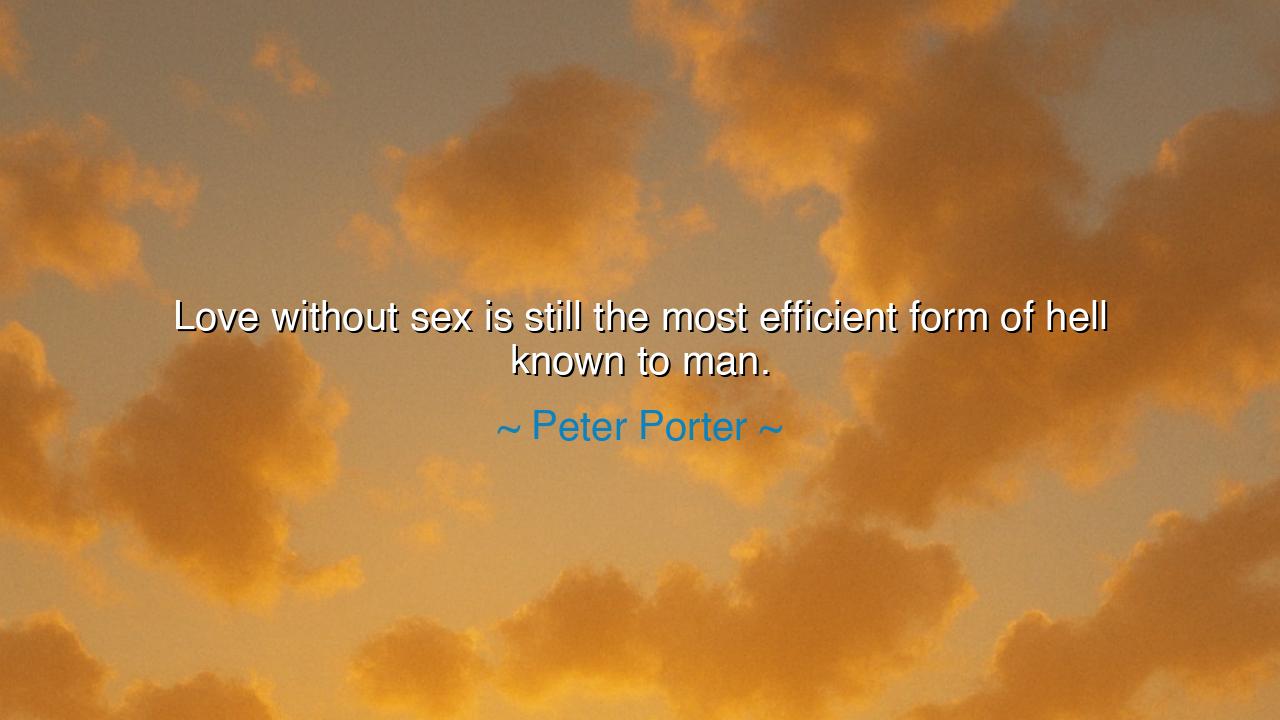
Love without sex is still the most efficient form of hell known






“Love without sex is still the most efficient form of hell known to man.” Thus spoke Peter Porter, the poet of irony and insight, whose words strike with both intellect and fire. In this searing truth, he exposes one of the deepest torments of human existence — the agony of unfulfilled love, of passion that burns without release, of affection bound in longing but denied expression. His is not a crude statement about desire, but a profound meditation on the union of body and soul — for in every true love, spirit seeks embodiment, and when that embodiment is forbidden or withheld, love itself becomes a form of torment, exquisite and eternal.
To understand Porter’s words, one must first understand what he meant by love. The love he speaks of is not the light affection of passing fancy, but the deep, consuming connection that transforms one’s very being. It is the kind of love that invades the thoughts, quickens the heart, and demands communion — not only of emotion, but of flesh and presence. For to love deeply is to yearn for unity, to bridge the impossible divide between self and other. When this yearning is thwarted — when two souls may love but not touch — it is as if paradise is glimpsed through glass: beautiful, but unreachable. This, Porter calls hell — not the fiery pit of theology, but the slow, tender torture of love that cannot be completed.
History and myth alike are filled with this truth. Consider the story of Héloïse and Abelard, the philosopher and his brilliant student, whose love in twelfth-century France defied every law of their time. Their passion was fierce, their letters aflame with both intellectual and physical desire. But when the world tore them apart — when Abelard was mutilated, and Héloïse condemned to the convent — their love endured, yet could no longer be fulfilled. In their letters, you hear Porter’s truth echoing across centuries: that love, when denied its natural consummation, becomes both sacred and unbearable, a flame that burns but never warms.
The ancients understood this torment well. The Greek tragedians knew that eros, the god of desire, was both divine and dangerous — a power that lifted mortals toward the heavens and hurled them down again in despair. Plato, in his Symposium, spoke of lovers as halves of a broken whole, forever searching for their lost completion. Yet what agony for the halves who find each other, only to be kept apart by circumstance, by fear, by fate! Porter’s “efficient hell” is this very state: not the absence of love, but its presence in a cage. It is to feel everything and touch nothing, to burn without consuming, to desire without rest.
Yet his words carry more than lamentation; they contain a lesson about wholeness — about the need for harmony between the body and the spirit. Love that denies the body denies half of its truth. Likewise, desire without love is empty, a shadow of connection. Porter’s insight is that both are sacred when united, but when divided, both become torment. The heart yearns for the closeness that only touch can affirm; the soul seeks the depth that only love can sanctify. To separate the two is to divide heaven from earth — and in that division, mankind finds his most intimate sorrow.
There is also a moral hidden here, though it is spoken not with condemnation but compassion: to love and be denied is part of the human condition. We are creatures of longing — for one another, for understanding, for the divine. This longing gives rise to art, to poetry, to all acts of creation. Even in hell, love creates beauty. Porter himself, a poet tempered by loss and irony, knew that suffering can purify passion, that longing can reveal depths of tenderness unknown to the satisfied. Yet he does not glorify this suffering; he simply names it for what it is — the most “efficient form of hell,” where pain and beauty are forever entwined.
So, my child, take this teaching and carry it gently. Do not fear desire, nor despise the body through which love seeks expression. But also do not worship love so blindly that you let it consume you in silence. Speak your longing. Live your affection. For the world is already filled with enough ghosts of unspoken love, with enough hearts that burned quietly into ash. Let your love, when it comes, be whole — not divided by fear or pride. Let it embrace both the tenderness of spirit and the warmth of flesh.
And if you ever find yourself in that “efficient hell” Porter described — loving someone you cannot have — remember this: even in that pain, you are alive, and your suffering is proof of your capacity for greatness. For the heart that feels so deeply, though it burns, also illuminates. But do not remain forever in the fire; seek what completes you. For love, when joined in truth and body, is not hell, but heaven on earth — the fulfillment of what it means to be human.






AAdministratorAdministrator
Welcome, honored guests. Please leave a comment, we will respond soon